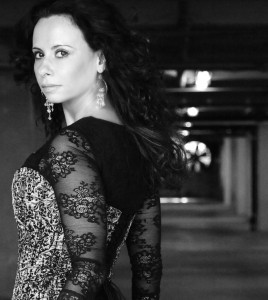
Opera Singer Misha Penton as Klytemnestra (photo by Kerry Beyer)
(Houston, TX) Houston based opera singer Misha Penton opens her unique performance space Divergence Vocal Theater this Friday, April 15th. Located at Spring Street Studios, home to many of Houston’s finest visual and mixed media artists. Divergence Vocal Theater will bring together Ms. Penton’s team of singers, musicians, composers, dancers, and lighting and costume designers to present new chamber opera repertoire. Klytemnestra, a collaborative opera dance theater work featuring music by composer Dominick DiOrio, sung text by Misha Penton, spoken text by John Harvey, and choreography by Meg Brooker, is receiving a great deal of positive press in advance of its premier April 15th and 16th at Divergence Vocal Theater.
Ms. Penton’s mission is to subvert the social mores and business paradigms preventing singers from creating their own works. In the wake of reality after graduate school, more and more classical instrumentalists are creating their own business and career models, going further and further out into what is, for many musicians, uncharted territory. Violinist Todd Reynolds, the ensemble Alarm Will Sound, and Houston based pianists Jade Simmons and Kris Becker are a few examples of musicians who are each developing a sustainable means for commissioning, performing, and deriving an income from playing contemporary classical music. Their approaches are as varied as their personalities, and there is much to discuss when it comes to what is actually working for one musician as opposed to another. But in the near future, these intrepid instrumentalists are going to find that more and more singers, including Misha Penton, are “out there” with them.
Misha and I met shortly after my relocating to Houston and I quickly recognized a kindred spirit. This interview took place via email in advance of the premier of Kyltemnestra.
Chris Becker: In a recent interview you said: “One of the things I want to do…is restructure the way people think about who does opera, how it’s done, who makes it, and who performs it…What I do with Divergence is…create my own works and I sing in them. It’s very much something actors and dancers do, but singers are not encouraged to create their own products.” Do you think this model that you’re describing is the future of classically trained musicians?
Misha Penton: Actually, I do – but it’s already happening. And it really isn’t anything new…instrumentalists in particular have been savvy to this model for a long time – the success of independent ensembles like Eighth Blackbird comes to mind immediately. Some conservatories are starting to take entrepreneurship seriously. Opera America has a great feature about entrepreneurship in its spring magazine and about singer-led initiatives, and entrepreneurship is the theme for the conference this year as well. Obviously rock and jazz musicians work this way and always have. I’m seeing more classically trained singers take on their own projects, but it doesn’t seem to be as encouraged by the vocal teaching tradition as it could be…but again, that is all changing. The more opportunities we, as artists create, the better we’ll be able to define success for ourselves. As a singer, I’m only partly an interpretive artist. I’m a theater artist and writer too, so I’ve always done creative work. I think of myself as an independent artist who happens to create work collaboratively.
 Opera Singer Misha Penton (photo by Kerry Beyer)
Opera Singer Misha Penton (photo by Kerry Beyer)
CB: Who are some of your peers among singers that are doing something similarly subversive?
MP There are more and more small opera companies popping up that singers are joining forces to create – that’s absolutely fantastic. And classically trained singers are branching out into all sorts of music projects. I meet singers all the time who say, “Hey I have this idea for a project” – I just love that. Go do it!
In general, I question the traditional company and nonprofit structure – so I’m not sure that’s the best survival tactic nor the best creative model. There are so many options for funding work now without forming a nonprofit (fiscal sponsorship, crowdfunding, etc). The last thing I want on my back is an “organization”. I work project-to-project and I’m aspiring to a Robert Fripp-ian model – a “small mobile intelligent unit”.